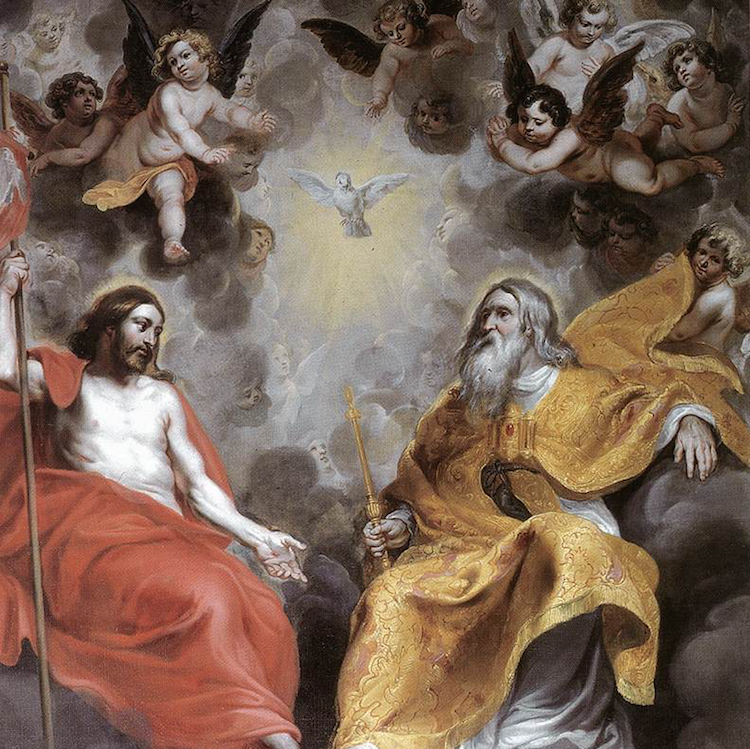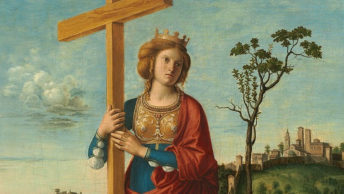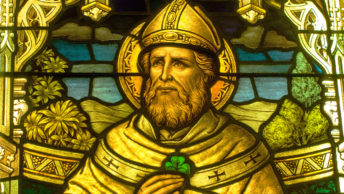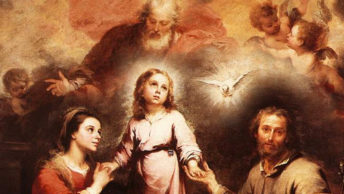Over the centuries the Virgin Mary has allegedly appeared to many different saints, mystics, and ordinary Catholics—and one of the first recorded instances of this occurred in the 3rd century to a young man named Gregory. He had been born a pagan, but was converted and baptized. Gregory soon gained such a reputation for holiness that the Church decided to ordain him a priest and, to his great reluctance, appoint him as bishop of his hometown. Realizing this was the will of God, he went off into the desert to pray and prepare himself, and then was ordained. However, Gregory was worried that he might not be the most qualified person when it came to teaching his people the truths of the faith; in particular, he wasn’t sure he’d be able to present the Church’s teaching on the Holy Trinity correctly, so he prayed earnestly to God for enlightenment. One night he fell asleep while meditating, and was awakened by the sudden arrival of an old man whose wise and luminous appearance suggested he had come from heaven.
The stranger said, “God has sent me to enlighten you, to solve the problems that are troubling you, and to teach you the truth you are seeking,” and then pointed off to one side; Gregory looked and saw a dazzling light, out of which appeared the Virgin Mary. She greeted Gregory, and then told the old man, whom she called John the Evangelist, to explain to him the mystery of the Holy Trinity. St. John did so, and ended with the words, “There is therefore nothing created, nothing greater or less in the Trinity, nothing superadded. . . . The Father has never been without the Son, nor the Son without the Spirit; and this same Trinity is immutable and forever unalterable.” Gregory was sad when both his heavenly visitors disappeared, but he was overjoyed and grateful at supernaturally knowing and understanding the truth of the Three Persons in One God. This vision gave him the confidence to preach in a powerful way over the next thirty years, and, through the grace of God, he also performed many miracles—so many, in fact, that he became known as St. Gregory the Wonder-worker (Saints Who Saw Mary, Raphael Brown, pp. 2-3). St. Gregory had wanted to know the truth about the Holy Trinity not out of intellectual curiosity, but that he might serve God’s people. In the same way, God reveals His Triune nature to us for a deeper and very practical purpose: namely, that we might gratefully realize we were created in love, that our calling is to be united in love, and that our happiness lies in living a life of love.
The doctrine of the Holy Trinity—three distinct Persons united as One, all-powerful, all-knowing, all-loving God—is unique to Christianity. On the one hand, it’s a very abstract, theoretical concept far beyond our comprehension; on the other hand, however, it’s also a very timely and important reality for us on a personal level—for, as today’s readings tell us, the existence of the Trinity calls for our wholehearted response. In the Book of Deuteronomy, Moses reminded the people of the many amazing things God had done on their behalf, and then declared, “You must keep His statutes and commandments. . . .” Jesus teaches us that God is our heavenly Father, and that He desires everyone to be saved; that’s why, just before returning to heaven, Our Lord commanded His followers to make disciples of all the nations, “baptizing them in the Name of the Father, and of the Son, and of the Holy Spirit.” Moreover, as St. Paul tells us in his Letter to the Romans, it’s through the Holy Spirit that we are adopted into the family of God. If we live as God’s children here on earth, relying on the Holy Spirit to help us remain faithful in spite of all difficulties, we will rejoice forever in the glory of God’s Kingdom.
The Church’s teaching on the Holy Trinity is an amazing testimony of love: God the Father in His love created us, Jesus the Son came to earth and died out of love to save us from our sins, and the Holy Spirit lovingly guides, strengthens, and protects us. While we’ll never comprehend the mystery of the Holy Trinity, it is possible for us to build our lives on this reality—and love is the key. Just as there are Three Persons in God, so there are three directions in which love must flow out from us. We must first of all, of course, love God. This means honestly trying to obey His commandments and observe the teachings of His Church, and sincerely seeking His forgiveness when we fall short; it means making His will the priority of our lives, and seeking His glory instead of our own—as St. Gregory did when he accepted his vocation in spite of his own reluctance. Loving God requires that we try to discover and do what’s morally right, even when it’s not easy or convenient, and it also means regularly spending time with the Lord and making room for Him in our hearts through prayer, Scripture reading, attending Mass, and receiving the sacraments. The second direction in which our love must flow out from us is toward other people. This means treating others as we wish to be treated, and respecting everyone—including those who are different from us or with whom we disagree; it means helping those in need whenever we can, forgiving people who offend us, and praying for others—not only for those persons we like, but especially for those whom we dislike. God invites everyone, without exception, to be part of His family, and so we have no right to withhold our love from anyone. The third direction in which our love must flow is, of course, toward ourselves. We are made in God’s image and likeness, and this means we have infinite value. Loving ourselves doesn’t mean becoming selfish or conceited, for these attitudes will harm us spiritually; true love of self means holding ourselves to high moral standards, and not giving up on ourselves when we fail to reach them. Christian self-love means discovering, developing, and using our talents and abilities, and avoiding anything that will harm us spiritually, physically, or emotionally; it means growing a little closer to the Lord every day, and responding to God and other people with humility and gratitude.
Little children don’t understand very much about how the world works, but they are able to love their parents and act accordingly—and this is what the Father, the Son, and the Holy Spirit ask of us. We can’t really grasp or comprehend the mystery of the Trinity, but we can base our lives on the reality of love the Trinity represents—and all who make this choice will experience eternal joy.








